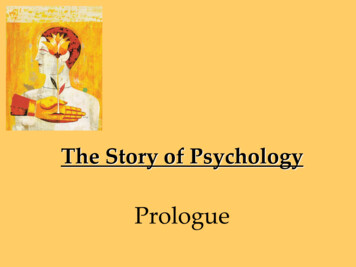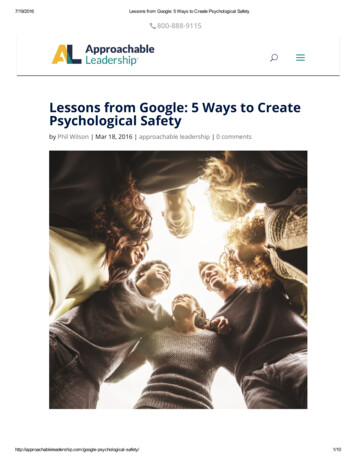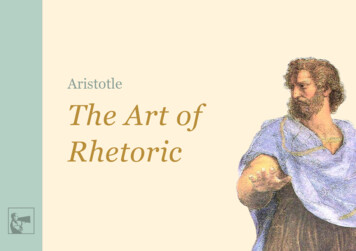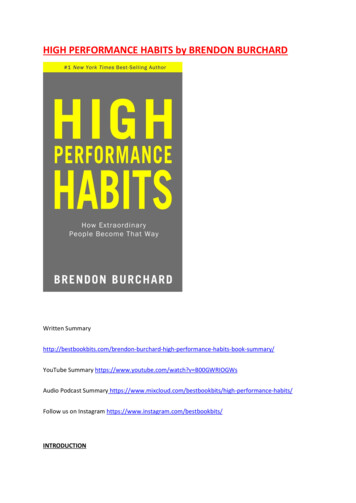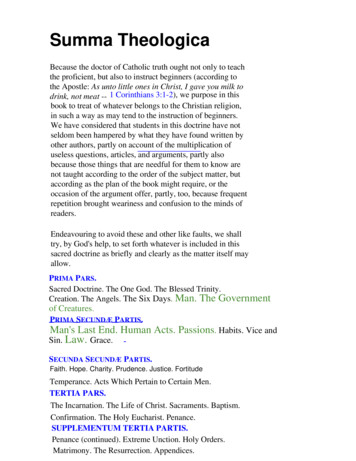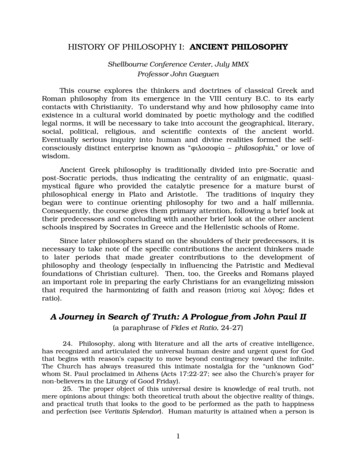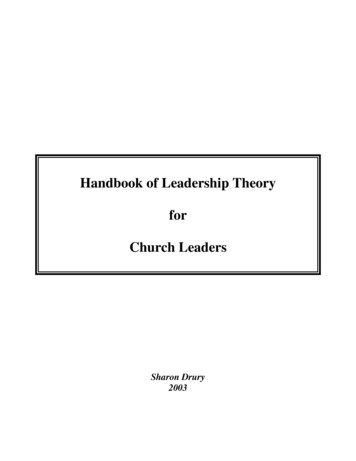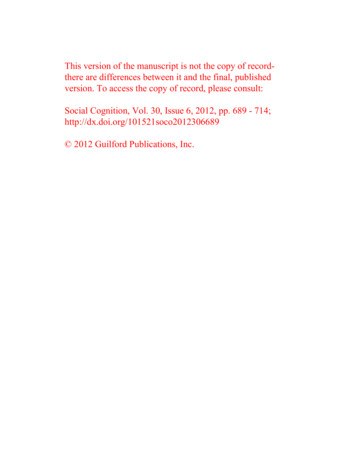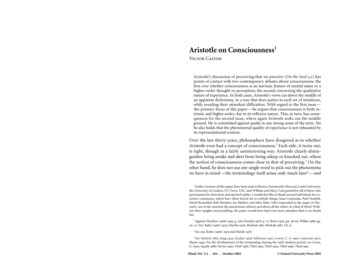
Transcription
Aristotle on Consciousness1Victor CastonAristotle’s discussion of perceiving that we perceive (On the Soul . ) haspoints of contact with two contemporary debates about consciousness: thefirst over whether consciousness is an intrinsic feature of mental states or ahigher-order thought or perception; the second concerning the qualitativenature of experience. In both cases, Aristotle’s views cut down the middle ofan apparent dichotomy, in a way that does justice to each set of intuitions,while avoiding their attendant difficulties. With regard to the first issue—the primary focus of this paper—he argues that consciousness is both intrinsic and higher-order, due to its reflexive nature. This, in turn, has consequences for the second issue, where again Aristotle seeks out the middleground. He is committed against qualia in any strong sense of the term. Yethe also holds that the phenomenal quality of experience is not exhausted byits representational content.Over the last thirty years, philosophers have disagreed as to whetherAristotle even had a concept of consciousness.2 Each side, it turns out,is right, though in a fairly uninteresting way. Aristotle clearly distinguishes being awake and alert from being asleep or knocked out, wherethe notion of consciousness comes close to that of perceiving.3 On theother hand, he does not use any single word to pick out the phenomenawe have in mind—the terminology itself arises only much later4 —and1Earlier versions of this paper have been read at Brown, Dartmouth, Harvard, Leeds University,the University of London, UC Davis, USC, and William and Mary. I am grateful to all of those whoparticipated for their keen and spirited replies. I would also like to thank several individuals for extensive comments, which have often forced me to rethink things: Juan Comesaña, Paul Neufeld,David Rosenthal, Bob Sharples, Joe Shieber, and John Sisko (who responded to the paper at Harvard), not to the mention the anonymous referees and above all the editor-in-chief of Mind. Without their insights and prodding, the paper would have had even more mistakes than it no doubthas.2Against: Hamlyn ( ) , p. xiii; Hamlyn , p. ; Rorty , pp. – ; Wilkes , pp. – . For: Kahn ( ) ; Hardie ; Modrak ; Modrak , Ch. .3See esp. Kahn ( ) and Hardie .See Siebeck ; Jung ; Zucker ; Schwyzer ; Lewis, C. S. ; Cancrini ;Mayer . For the development of the terminology during the early modern period, see Lewis,G. ; Aquila ; Davies ; Thiel ; Thiel ; Thiel ; Thiel ; Thiel .4Mind, Vol. 111 . 444 . October 2002 Oxford University Press 2002
752 Victor Castonhe does not share the epistemological concerns distinctive of the Cartesian conception of consciousness, such as privacy or indubitability.Neither of these results should make us pause. For it is not clear thatwe have a single concept of ‘consciousness’, despite the word;5 and manyof the topics we discuss under this label are clearly issues about whichAristotle has something to say. His treatment of perceiving that we perceive in particular has points of contact with a current debate over thenature of consciousness, between those who take consciousness to bean intrinsic feature of mental states and those who think it consists in ahigher-order thought or perception. Aristotle’s view, I shall argue, cutsdown the middle of this apparent dichotomy, in a way that does justiceto each set of intuitions, while avoiding their attendant difficulties. Hisdiscussion has ramifications, in turn, for a related debate over thenature of ‘qualia’, between those who think that qualia belong to ourexperience and those who think they are merely represented as belonging to objects in the world. Here, too, Aristotle steers for a middlecourse, but his comments are more sketchy and underdeveloped.In what follows, I shall focus almost exclusively on perceptual consciousness. But many of Aristotle’s views are clearly meant to extend toother mental states in a fairly obvious way. The qualifications requireddo not substantially alter the framework laid out here.6After a brief overview of the issues surrounding higher-order theories of consciousness (section ), we shall turn to a close examination ofAristotle’s views, beginning with his conception of perceptual awareness in general (section ). I shall then offer a detailed analysis of hisarguments in On the Soul . concerning how ‘we perceive that we seeand hear’ (sections – ). These arguments have been systematicallymisconstrued in the past; once properly explicated, they offer a viewthat has distinct advantages over both higher-order and intrinsic theories of consciousness (section ). The resulting sense in which consciousness is ‘transparent’ and ‘reflexive’ on Aristotle’s view is alsodistinctive (sections – ); and this has implications for his views aboutthe phenomenal quality of perceptual experience (section ). I shallconclude by considering various objections to these views and possible5See, e. g., Dennett ( ) , p. ff.; Wilkes ; Wilkes ; Lycan , Ch. ; Block ;Block ( ) .6The main qualifications concern the type or mode of awareness we have of our own thinking:on this point, see the discussion below in nn. and . A full treatment would require discussionof Aristotle’s views on the Divine Intellect, whose ‘thinking is a thinking of thinking’ (1 nÒhsiwnoÆsevw nÒhsiw, Metaph. . , b ). But this is obviously a substantial topic in its own rightand would take us far afield from many of the concerns addressed here.Aristotle on Consciousness 753replies available to Aristotle (section ). A brief excursus on the innersense(s) has been appended to the end of the article.1. Consciousness and higher-order mental statesAristotle’s views constitute a fresh contribution to current debates overthe nature of consciousness. It is one of those cases where a distinctiveview emerges from a close reading of an historical figure, given his owncontext and concerns, rather than one where a framework alien to hisown is forced onto his claims. To show this, a certain amount of exegetical detail is naturally required. Therefore it may be helpful to surveythe sorts of issues at stake first, so as to keep the larger picture in view.These are obviously not the only issues one might be interested in whenthinking about consciousness, or even necessarily the most interestingones. But they are the ones relevant to Aristotle’s concerns.To begin with a gross truism: throughout Western philosophy, therehas been a long-running concern with the relation between the soul ormind, on the one hand, and the body, on the other. Humans and animals seem different from most other things, in both their abilities andtheir behaviour; and so it is natural to ask whether that which distinguishes them—call it their ‘soul’—is in some sense continuous withthe natural world around, or whether it marks an abrupt infusion ofsomething wholly different into the world. At different times, differentfeatures have been picked out as what is distinctive. Over the past fewcenturies, one feature that has been repeatedly invoked is consciousness, a kind of awareness that we seem to have in many, if not all, of ourmental states, over and above the primary intentional content thesestates possess: to use an overly familiar metaphor, it is as if, in additionto the information they carry, these states were suffused with a kind oflight. Accordingly, consciousness has often been treated as if it were anintrinsic feature of such states, which is not further analysable (a characteristic that might in fact help to explain the frequent resort to metaphors). The qualitative character of such states—their ‘felt’ quality inconsciousness—likewise seems inexpressible except by referring to thequalities of the objects those states happen to be about. This has suggested to some that consciousness involves a kind of ineliminable subjectivity, a feature that constitutes a primitive and irreducible feature ofmentality.Higher-order theories of consciousness suggest an alternative. A conscious state is one that we happen to be aware of; and we are aware of it,according to these theories, in virtue of another mental state that is of
754 Victor Castonor about the first mental state. Thus, if I am consciously looking at theGolden Gate Bridge, I not only see the Golden Gate Bridge; I am alsoaware that I am seeing the Golden Gate Bridge. According to higherorder theories, this is because I am in a second mental state that isdirected at the first; and this second state is of a higher-order preciselybecause its content concerns a mental state and its content. Dependingon the theory, this second, higher-order mental state will either be akind of judgement or, on so-called ‘inner sense’ or ‘internal monitoringcapacity ’ views, a certain kind of perception.7 What makes a mentalstate conscious on any of these views, then, is not an intrinsic feature ofthat state, but one that depends on its relations to other mental states. Ifso, consciousness is no longer an unanalysable primitive, but something that possesses an ‘articulated structure’, whose elements can befurther distinguished and specified.8 More precisely, consciousness onthis view is just a special case of intentionality, where certain kinds ofmental state are directed upon others, in a way that embeds their content. And this at least leaves the door open for a naturalistic approach tothe mind. For now it can be argued that consciousness can be accommodated within a naturalistic scheme to exactly the same extent thatintentionality can.Such a move is not without its costs, of course. To begin with, thevery feature that promises to make consciousness tractable, theoretically speaking—the suggestion that it is a relational feature, and not anintrinsic one —runs counter to a fairly deep-seated intuition that conscious states are not so much observed from without, as ‘illuminated’from within. Second, such theories require us to posit many additionalmental states to account for the conscious states we do have. Even ifsuch proliferation is acceptable, it effectively rules out the possibilitythat all mental states are conscious states and hence the possibility thatconsciousness is an essential feature of mentality. For while higherorder mental states can themselves be conscious in virtue of still higherorder states, it seems that this regress cannot continue indefinitely; andso at some point we will reach a higher-order state that makes anotherstate conscious without being conscious itself. Finally, it may be questioned whether such a theory provides a satisfying account of ‘qualia’and the felt character of conscious states, especially if the higher-orderRecent theorists who have accepted these labels include D. M. Armstrong ( , pp. – , – ) and William Lycan ( ; ; ( ) ). The phrase ‘internal monitoring capacity’comes from the latter; ‘inner sense’ is, of course, traditional. For a brief history of the term, and itsconnection with the Aristotelian tradition, see the excursus at the end of the article (pp. –4 below).78For example, Rosenthal , pp. , , ; Rosenthal b, p. ; Rosenthal , p. .Aristotle on Consciousness 755state is held to be a kind of thought or judgement. Even when it is heldto be a kind of perception, it is unclear whether it locates the qualitativeaspect of experience in the right place.Aristotle has much to say about these issues. To be sure, his primaryconcern is not whether consciousness, much less subjectivity, is an irreducible feature of mentality. But he does believe that the presence ofhigher-order awareness is something that distinguishes sentience andother forms of cognition from noncognitive changes; and he speaksdirectly and at length about how we perceive that we perceive. He offersseveral arguments on the subject, against the sort of higher-order viewwe have just been considering, while at the same time managing to coopt its most attractive features. On Aristotle’s view, the awareness thatwe have of our own mental states is an intrinsic and essential feature ofthose states; and yet it is to be explicated in terms of intentionality. Ittherefore remains equally congenial to a naturalistic approach to themind, an approach I would argue he himself favours.2. Perceptual awarenessPerceiving for Aristotle is a natural change brought about by the perceptible qualities of objects in the environment. But he still worrieswhether this change is wholly distinct from other sorts of naturalchange or, if there are continuities, in just what way it differs. At the endof On the Soul . , for example, he asks whether perceptible qualitiescan bring about any changes other than perception. A smell, by its veryessence, is the sort of thing that brings about smelling ( b – ). But italso can have an effect on inanimate bodies—not, he stresses, simply invirtue of concomitant properties that its material basis happens tohave, but precisely in so far as it is a smell (b – ). A smell, he concludes, can also make air smelly, that is, make the air something that canprovoke further incidents of smelling (b – ).Such commonplaces, though, raise an obvious worry. Exactly what isthe difference between making something smell and just making itstink? Whatever change the air does undergo, it is not sentient and socannot smell anything. How, then, does this change differ from whathappens in the nose of a animal? Or, as Aristotle puts it,What, then, is smelling besides undergoing a certain change?9 ( b )His use of ‘besides’ (parã) here sharpens the difficulty. It presupposesthat a change is undergone (pãsxein ti, b ) when someone smells just9Taking ti as an internal accusative, as in the previous line (pay2n ti, b ). See also Hicks , ad b and esp. a .
756 Victor Castonas much as when the air takes on an odour (pay2n ti, b ). Had Aristotle meant to contrast smelling with undergoing a change outright, hewould have used ‘instead of ’ (ént3).10 On the contrary, his worry stemsprecisely from the fact that undergoing a certain kind of change is common to both cases, that there is a univocal sense in which both can besaid to change in this way. Otherwise, the problem evaporates. If perceiving is a special case of undergoing a change (Burnyeat ( ) ,p. ), it can only be because of what else is true of the event, and notbecause it involves a distinct sense of ‘undergoing a change.’11The difference between these two changes must therefore beexplained by some further difference. Here Aristotle limits himself tothe following observation:Isn’t it that while smelling is perceiving, air becomes perceptible when it undergoes a sudden change? ( b – )A pregnant response, at best. It is certainly not ‘all he needs to say ’,since ostensibly it is just a restatement of the difference that gives rise tothe problem, with genus substituted for species: ‘perceiving’ has takenthe place of ‘smelling’ and ‘perceptible’ of ‘smelly’. Without importing a10It is important to see that this point is independent of the recent disagreement between Johansen and Sorabji. Sorabji argues ( , pp. – ) that Aristotle’s use of ‘besides’ (parã) implies that smelling is itself a case of undergoing change. Johansen objects ( , n. ), citingthe following passage from Nic. Eth. . : ‘It does not matter whether the ends of action are the activities themselves or something else besides these [parå taÊtaw êllo ti]’ ( a – ). In thissentence, ‘X is something besides Y’ does not imply that ‘X is also Y’: the second disjunct explicitlystates that ends are ‘something other’ (êllo ti) than the activities. Johansen concludes that wecannot therefore infer in On the Soul . that smelling is a case of undergoing change.While Johansen is right that the use of parã does not imply that ‘X is also Y,’ it neverthelessdoes presuppose that there is a Y as well as an X. This is true even in the passage Johansen citesfrom the Nicomachean Ethics: according to the second disjunct there will be activities as well asends distinct from them. But that is all that is needed. For it follows that a change is undergonewhen smelling occurs, whether (a) smelling is one and the same in number as this change, so thatit is a smelling as well as a change (as Sorabji claims); or (b) smelling merely accompanies thischange, as something else that occurs ‘alongside’ it. Although I would prefer the monism of (a) tothe parallelism of (b), it does not affect my argument above, since (b) equally implies that a changeof the relevant sort occurs. Neither reading is compatible with an interpretation that denies there isa change in smelling of a sort that can occur in inanimate things (for example Burnyeat ,p. ).On Aristotle’s use of parã in general, see Bonitz ( ) , a – ; Eucken , pp. – .11As Sorabji has rightly pointed out ( , pp. – ), this reading does not depend onTorstrik’s insertion of ka3, based on ms. E, which can easily be suspected of being an error resulting from dittography (see Kosman , pp. – ). The point here depends on the use of parã instead: whatever additional truths hold of perceiving and not of inanimate things, it will still be truethat perceiving is either (a) a change of a sort that inanimate things can also undergo or (b) accompanied by such a change. See n. above. Burnyeat now acknowledges that perceiving involvesthe same sort of change as occurs in the medium, which is inanimate; the only difference betweenthem is that the former occurs in a being with the power of perception and the latter does not( , pp. , – ; cf. , pp. – ). He still maintains, though, that both changes are quitedifferent from ‘ordinary changes’: see esp. his recent .Aristotle on Consciousness 757more comprehensive understanding of Aristotle’s views of perception,we could not hope to find this statement illuminating. That the difference between perceiving and becoming perceptible has something to dowith the difference between the animate and the inanimate is beyonddoubt. The question is just what that difference consists in.Obvious places to look include earlier in the same chapter or evenearlier in the same book, in On the Soul . . But there needn’t be justone difference in any case. In Physics . , Aristotle notes several distinctions between the animate and the inanimate relevant to the presentdiscussion:Whereas what is animate undergoes alteration in the ways that somethinginanimate does as well, what is inanimate does not alter in all the ways thatsomething animate does. For [what is inanimate] does not alter in the manner of the senses; and what is [inanimate] is unaware, while what is [animate]is not unaware, of undergoing change. Nothing, however, prevents what is animate from being unaware as well, whenever the alteration does not occur inthe manner of the senses.12 ( b – a )Aristotle begins with the obvious point that inanimate things do notperceive objects in their environment. But he adds a further and moreinteresting difference. Animate things are ‘not unaware of undergoingchange’ (oÈ lanyãnei pãsxon) when alteration occurs in the manner ofthe senses, whereas nothing inanimate is aware of any such change( b – a ).13 The participial construction with lanyãnein assures usthat this is not the same point as the first.14 Animate things are not onlyaware of objects in their environment through perception; they are alsoaware of undergoing this alteration itself. This isn’t proprioceptioneither: it is not a question of being aware of eye movement or the like,but of being aware of an alteration that in some sense constitutes perception ( b – ). To be aware of the changes one undergoes ‘in themanner of the senses’ is to be aware in some sense of one’s perceiving.This is still more evident from On Perception and Perceptibles ,where Aristotle uses this assumption to reject a view held by some ofhis predecessors. They believe that the eye is made of fire, on the12Following the main version, a, as printed in Ross’s edition (with slight alterations to hispunctuation).13For the qualification concerning alterations not ‘in the manner of the senses’, cf. On the Soul . , a –b ; Plato Phlb. 33D–34A, 43AB.14The point is obscured in Wardy’s translation, which takes pãsxon to serve as the subject oflanyãnein and supplies gignÒmenon as a dependent participle: ‘what is happening escapes the noticeof the thing affected if it is inanimate, while it does not if the thing is affected is animate’ ( ,p. ; emphasis mine). Rendering lanyãnein as ‘escapes notice’ also has the unfortunate consequence in the present context of suggesting that inanimate things do notice other things.
758 Victor Castongrounds that you can see it flash when you rub your eyes in the dark.But Aristotle thinks that such a view leads to absurdity:But this view faces another difficulty, since if it is not possible to be unawareof perceiving and seeing something seen, then necessarily the eye will see itself.Why, then, doesn’t this happen when it is left alone?15( a – )If the eye were made of fire, as his predecessors claim, and this is something that we can see, then we should be able to see this even when wearen’t rubbing our eyes. But we do not see any such thing, since we arenot aware of it; hence, the eye must not be made of fire. This argumentdepends crucially on the assumption that it is impossible to be unawarethat one is perceiving something while one is perceiving it (cf. , a – ). This is not an assumption Aristotle’s predecessors make,but one he imports into the discussion—he is not trying to catch themin a contradiction so much as show that their view is not in accordancewith the facts. He is not entitled to reject their view, therefore, unless hehimself accepts this assumption, as he evidently does.Several features of Aristotle’s position are worth noting. Consider theversion of the thesis stated in Physics . (above p. ). First, it isoffered in a fully general form: it is meant to distinguish perceptionfrom any change, animate or inanimate, that does not enter awarenessor ‘reach the soul’, to use Plato’s language from parallel passages of thePhilebus (§p‹ tØn cuxØn diejelye›n, d– A, AB).16 In Aristotle’s view,alteration ‘in the manner of the senses’ is always accompanied by thiskind of awareness.17 In fact, he claims elsewhere that such awareness istemporally continuous and so present in every subinterval duringwhich we perceive (On Perception and Perceptibles , a – ).18Aristotle on Consciousness 759Second, if his remark is this general, Aristotle cannot plausibly meanthat animals are continually aware of such changes as a result of deliberately observing them and directing their attention to them. His manner of expression confirms this. He says only that animals are ‘notunaware’ of such changes, the use of litotes suggesting that introspection, in any strong sense, is not at issue.19 The awareness in questionforms a part of one’s normal experience in an unobtrusive and effortless way.Third, Aristotle appears to have phenomenal awareness in mind.Consider his claim that there are the changes in our bodies of which weare not, in fact, aware. Aristotle would not be in a position to make thisclaim if we were completely without empirical access to them. But suchchanges can of course be observed via the senses: by someone’s puttingher ear to my chest, for example, or through the more gruesome opportunities afforded by the operating theatre and battlefield. In fact, givena little ingenuity (or misfortune), one can even witness them in oneself.But there is still a sense in which we cannot feel or experience suchchanges.20 When we perceive, in contrast, we not only have direct, internal access to the information that we are perceiving; our perceiving isitself something that does not ‘escape our notice’ (oÈ lanyãnei).21 Sorabji is perhaps right to characterize this as Aristotle’s ‘most Cartesianremark’ (( ) , p. , emphasis mine; cf. p. ). But it does notpresuppose anything more than phenomenal awareness.1915Following the majority of the mss.; Ross’s emendations are entirely gratuitous.Cf. also Tim. C: diå toË s2matow a9 kinÆseiw §p‹ tØn cuxØn ferÒmenai prosp3ptoien. D:toÊtvn tåw kinÆseiw diadidÚn e7w ëpan tÚ s«ma m xri t4w cux4w a‡syhsin par sxeto taÊthn. AB: §p‹ tÚ frÒnimon §lyÒnta §jagge3l5. B: m xri cux4w plhgØn diadidom nhn. Rep. . C: a·ge diå toË s2matow §p‹ tØn cuxØn te3nousai. Similar expressions can also be found both earlier, inthe Hippocratic treatise On the Sacred Disease (§w d tØn sÊnesin 6 §gk falÒw §stin 6 diagg llvn, . Grensemann; cf. . ). They also occur in Aristotle himself. Cf. On the Soul . , b – :éllÉ 6t m n m xri §ke3nhw [sc. cux4w], 6t dÉ épÉ §ke3nhw. On Perception and Perceptibles , b – : 1 dÉ a‡syhsiw ti diå s2matow g3gnetai tª cuxª.1617He extends a similar view to quasi-perceptual cases: when one is using one’s personal memory, for example, it is not possible to be unaware of remembering (§nergoËnta d tª mnÆm5 lanyãnein memnhm non oÈk ¶stin; On Memory and Recollection , b – ).18This text together with a passage from the Nicomachean Ethics . (see below, p. 774) have ledseveral scholars to wonder whether Aristotle anticipated Descartes’s cogito: Bréhier – , Schuhl ; Braun . The connections, though, are fairly distant (as Bréhier recognized): see also, forexample, Oehler , pp. – and , pp. – .For a survey of different conceptions of introspection, see Lyons .20In speaking of ‘phenomenal awareness,’ I do not intend the discussion to be restricted to perceptual experiences (or quasi-perceptual ones, for that matter). In the Posterior Analytics, for example, Aristotle describes mistakes that ‘can, as it were, be seen by thought, though we are notaware of it in a verbal form’ (oÂon 6rçn tª noÆsei, §n d to›w lÒgoiw lanyãnei; . , b ). Similarly,when he considers Plato’s theory of recollection, he rejects as absurd the consequence that wecould have such knowledge without being aware of it (lelÆyasin; . , b – ). In this case, it isclearly phenomenal consciousness that is at issue, not ‘access consciousness’ (on which, see thenext note). For Plato insists that we have access to such inborn knowledge even before we becomeaware of it; indeed, Socrates’ elenctic method relies precisely on this fact. But until we have beenquestioned in the appropriate way, we do not become aware of it and so ‘recollect’ it.21Thus, I would maintain that Aristotle is concerned with what some theorists have called ‘phenomenal consciousness’, as distinct from ‘access consciousness’ (see, e. g., Block ( ) ). Access consciousness, roughly speaking, is a matter of what information is available to a cognitiveagent in such a way that it can be directly controlled for use in reasoning and action. But it seemsthat a cognitive system might utilize informational content in this way without experiencing itphenomenally (as a zombie or a robot might); hence, the need for a distinct notion of phenomenalconsciousness.
760 Victor Caston3. Perceiving that we perceiveWe needn’t rely on hints and suggestions, though. Aristotle has much tosay about perceptual awareness, most prominently in the opening arguments of On the Soul . ( b – ). Starting from the assumption thatwe do in fact perceive that we see and hear, he asks what must be thecase in order for this to be possible. In his view, only two lines of explanations are available, and one of them is open to objection. It will beuseful to begin with a representative translation, such as Hamlyn’s, andto keep the Greek alongside, as much will turn on its interpretation:É Epe‹ dÉ a7syanÒmeya ti 6r«men ka‹ ékoÊomen, énãgkh µ tª ˆcei a7syãnesyai ti 6rò, µ t r&. éllÉ 1 aÈtØ ¶stai t4w ˆcevw ka‹ toË Ípokeim nouxr2matow, Àste µ dÊo toË aÈtoË ¶sontai µ aÈtØ aÍt4w. ¶ti dÉ e7 ka‹ t rae‡h 1 t4w ˆcevw a‡syhsiw, µ e3w êpeiron e‰sin µ aÈtÆ tiw ¶stai aÍt4w: Àstɧp‹ t4w pr2thw toËto poiht on.Since we perceive that we see and hear, it must either be by sight that oneperceives that one sees or by another [sense]. But in that case there will bethe same [sense] for sight and the colour which is the subject for sight. Sothat either there will be two senses for the same thing or [the sense itself] willbe the one for itself. Again, if the sense concerned with sight were indeed different from sight, either there will be an infinite regress or there will be some[sense] which is concerned with itself; so that we had best admit this of thefirst in the series. ( b – )On Hamlyn’s reading, Aristotle hopes to identify the capacity responsible for this sort of awareness, and he proceeds by dichotomy: as heSuch a distinction, however, raises the question of how Aristotle might respond to cases suchas ‘blindsight’ is alleged to be or, better still, visual form agnosia (as in the case of D. F. in Milnerand Goodale’s recent study ( , esp. Ch. )), where a cognitive agent is able to utilize visual information in the execution of certain motor tasks, but reports not seeing the relevant features orfails to recognize the objects or features as such—cases, that is, where an agent appears to haveaccess to perceptual information, without having phenomenal awareness of the items in question. Given his distinction between the animate and the inanimate, Aristotle must deny that suchcases constitute perception, since the subject is unaware (in the relevant sense) that he is undergoing the change in question. But he needn’t deny that such information is in some sense present inthe body and as such can affect behaviour. For while he maintains that all cases of perception andt
Aristotle’s discussion of perceiving that we perceive (On the Soul . ) has points of contact with two contemporary debates about consciousness: the first over whether consciousness is an intrinsic feature of mental states or a higher-order thought or perception; th
